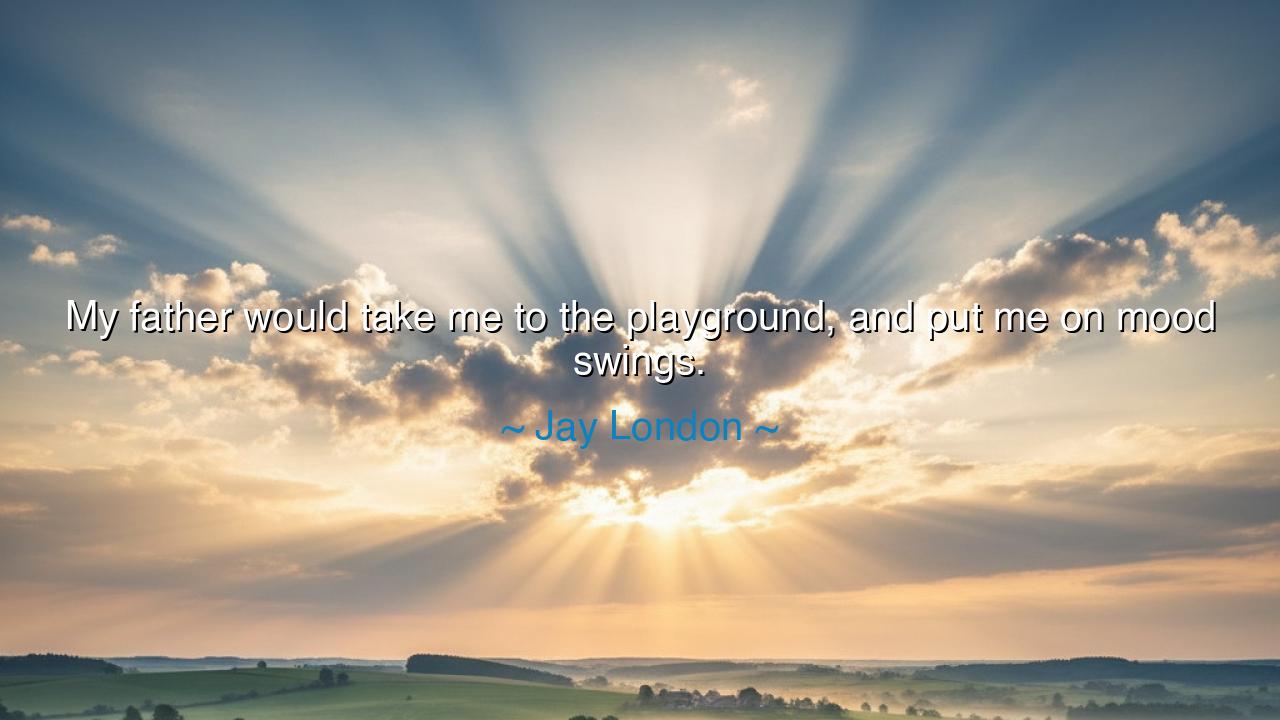
My father would take me to the playground, and put me on mood






"My father would take me to the playground, and put me on mood swings." These words, spoken by the comedian Jay London, may seem lighthearted at first glance, but within them lies a profound reflection on life's unpredictable nature and the complexities of human emotion. The idea of being placed upon "mood swings" is a metaphor—a playful reflection of how our emotions often ebb and flow, swinging like the movements of a playground swing, sometimes high, sometimes low, without warning or reason. It is a reminder, passed from father to child, that life itself is filled with contradictions, ups, and downs, and it is our response to these shifts that truly defines us.
In the ancient world, the wise sages often spoke of the impermanence of life, of the fleeting nature of joy and sorrow. The Buddha taught that life is like a river, constantly flowing, and we are but travelers on its surface, subject to its currents. Heraclitus, the Greek philosopher, said, “You cannot step into the same river twice” because both the river and the traveler are always changing. Just as the swing of a playground ride can take us up into the sky one moment, only to drop us back to the earth the next, so too does life present us with moments of ecstasy and moments of despair. The key, the sages say, is not to resist the motion but to embrace the ride.
Consider the ancient mariners who braved the great seas. They knew well the unpredictable nature of the oceans. At one moment, their ships might glide across calm waters, the stars above guiding them with certainty; in the next, the waves would rise up in fury, and the winds would howl. Yet the mariners did not fight the tides. Instead, they learned to steer their ships with wisdom, adapting to the winds and the waves. So it is with our emotions. Like those mariners of old, we must navigate the swings of life, acknowledging the highs and lows, but never letting them define our journey. The lesson is that, like the swing, life is both momentary and ever-changing, and we are called to move with it rather than against it.
The mood swings described by Jay London may also remind us of the role of the father—a symbol of guidance and wisdom in many cultures. In this playful recollection, the father is not just a protector, but a teacher, one who shows the child that the swings of emotion are inevitable, but how we respond to them is in our hands. Fathers of old were often seen as the guardians of life’s lessons, teaching their children how to navigate the world with resilience, balance, and grace. The playful nature of this lesson—placing a child on the mood swings—suggests that life’s challenges should not be feared or avoided, but rather embraced with courage and playfulness.
Let us now turn to a modern example that echoes this sentiment: Nelson Mandela, a man who lived through the tumult of apartheid, the loss of his freedom, and years of imprisonment, yet emerged with a heart full of forgiveness. In his youth, he too must have experienced mood swings, moments of great hope, and moments of deep despair. But he did not let his emotions control him. Instead, he learned to hold his ground, to endure the low moments, and to cherish the high ones. Just as a father might place his child on a swing, knowing the child will rise and fall, Mandela understood that hope and freedom would rise and fall as well, but that the journey itself was worth the ride.
The key teaching in Jay London’s words is one of awareness and acceptance. We must all come to terms with the fact that life is full of mood swings—moments of joy followed by moments of sorrow, moments of triumph followed by moments of failure. The world will never be static, and neither will our hearts. The father’s lesson, then, is to embrace both the highs and the lows, to understand that each is part of the cycle of life, and to approach both with equanimity. It is not the events themselves, but how we respond to them, that shapes our destiny.
To walk in the way of the wise is to understand that life, much like a child on a swing, will move us through the heavens and the earth, through the light and the dark. The only constant in the world is change, and accepting that change is the key to inner peace. Therefore, O seekers of wisdom, let us not be fearful of the mood swings of life. Instead, let us learn to ride them with the joy of a child, knowing that no matter how high or low we go, we are always moving forward. And, like the mariner on the great sea, we must trust that the winds and the waves will carry us where we need to go, if only we let them.
So, take this lesson to heart: in every moment of joy or sorrow, of triumph or defeat, remember the mood swings of life. They are not to be feared, but embraced, for they are the very rhythm of our existence. Ride them with wisdom, and, in the end, you will find that each swing—whether high or low—carries you closer to understanding the truth of your own heart.






AAdministratorAdministrator
Welcome, honored guests. Please leave a comment, we will respond soon